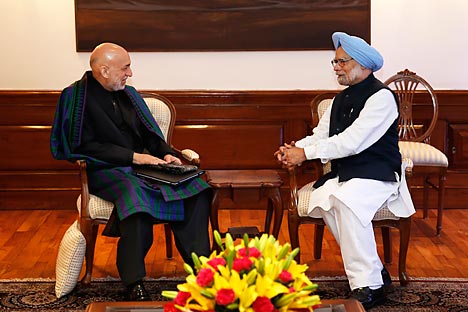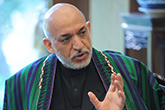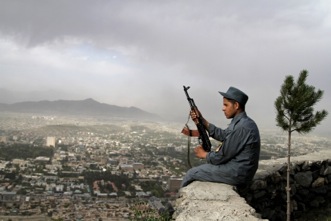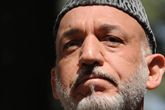India resets its Afghan policies

Manmohan Singh talks to Hamid Karzai in New Delhi on December 13, 2013. Source: AP
The thirteenth visit to India by Afghan President Hamid Karzai, his fifth in the last three years alone, will stand out as a watershed event in the relations between the two countries. India is resetting its Afghan policies and exploring avenues of regional cooperation.
The templates are by no means new but there are nuances of fresh thinking to attune Indian policies to the imperatives of the post-2014 scenario, which also happens to be unfolding against a backdrop of growing regional tensions stemming from the US’ rebalance to Asia.
Intense discussions took place during Karzai’s visit regarding the developing Afghan situation in all its dimensions and the regional milieu and the international situation that provides its setting. Karzai keenly follows regional and international politics and is known to be a practitioner of geopolitics.
The entire Indian leadership was involved in the talks with Karzai – President Pranab Mukherjee (who has immense experience in diplomacy), Vice-President M.H. Ansari (a former ambassador to Afghanistan), External Affairs Minister Salman Khurshid and National Security Advisor Shivshankar Menon (a former envoy to Pakistan and China).
Curiously, the “talks” began even before Karzai arrived in Delhi and also continued after he left Delhi. Karzai and Mukherjee found themselves together at Nelson Mandela’s funeral. Again, after the talks in Delhi, Ansari and Karzai happened to move away from the madding crowds of the Indian capital to the sequestered western Indian city of Pune ostensibly to attend an investiture ceremony at a local university.
Much of the media attention was focused on India’s defence cooperation with Afghanistan and the US-Afghan standoff over the signing of the Bilateral Security Agreement relating to the establishment of the American and NATO military bases in Afghanistan. Clearly, Delhi is willing to do whatever it can to render help for the “capacity building” of the Afghan forces. India’s strength lies in providing training facilities for Afghan military officers.
Tread softly…
Interestingly, on the eve of Karzai’s visit, Prime Minister Nawaz Sharif deputed a special envoy to Delhi with a letter to Manmohan Singh outlining a new set of proposals to improve relations and pledging to go the “extra mile”. It is still within the realms of possibility that Manmohan Singh may visit Pakistan during his remaining six months in office.
At any rate, Karzai’s visit this time around dispensed with the usual trappings of posturing toward Pakistan. The singular absence of rhetoric directed against Pakistan – by Karzai or the Indian leadership – couldn’t have gone unnoticed in Islamabad. In fact, Karzai even praised Sharif (who recently visited Kabul) for seeking an improved relationship with Afghanistan and India.
In sum, neither Delhi nor Kabul is inclined to push the envelope of defence cooperation and tread on Pakistani sensitivities at this delicate juncture in the geopolitics of the region. Karzai is on record that he has reached an understanding with Sharif to kick-start peace talks with the Taliban and some major developments can be expected. (Karzai is shortly heading for Turkey, which is the probable venue of peace talks.)
Friendship and cooperation with India creates diplomatic space for Karzai to negotiate with Pakistan, and in turn he like any Afghan statesman in history is savvy enough to realize that it is not in Kabul’s interests to annoy Islamabad. It has always been a delicate 3-way diplomatic pirouette of great sophistication, which bystanders and observers do not easily grasp.
Suffice to say, the intense excitement in the media that Karzai came to the great mall in Delhi to buy tanks and artillery guns turned out to be off the mark. Karzai told the media that his talks with Manmohan Singh were “very productive, resulting in satisfaction for the Afghan side.” Karzai has a way with words and he told inquisitive journalists, “We hope to have an army to defend Afghanistan through its own resources and its own citizens. To that objective we are being helped by India.” He added in good measure that India is “wise to carefully weigh the implications” of greater defence cooperation.
India will train up to 1000 Afghan army officers annually in its military academies and war colleges. It may take up Karzai’s suggestion on Indian instructors training Afghan officers at the “Sandhurst-on-the-dust” that came up recently near Kabul with British assistance.
Meanwhile, India and Russia are working together to rehabilitate the weapon maintenance centre set up near Kabul during the Soviet era. Of course, this is a major development carrying much political symbolism, especially at the present juncture of regional politics, and is an unambiguous signpost of Indian thinking and priorities in Afghanistan.
The Indian foreign ministry statement said Manmohan Singh and Karzai agreed on “deepening defence and security cooperation, including through enhancement in training and meeting the equipment and infrastructure needs” of Afghan armed forces, which would “increase their operational capabilities and mobility.”
Line in the sand
Prior to Karzai’s arrival in Delhi, Washington expressed the hope that the Indian leadership would persuade Karzai to sign the BSA without delay. But in the event Delhi drew a line in the sand.
India shares Karzai’s wish to have the BSA, but will not be “prescriptive”, “intrusive” or be “judgmental.” The Indian spokesman was explicit: “We are confident that President Karzai is a sagacious and wise leader, and he will do what is best for the people of Afghanistan. As a close and steadfast friend of Afghanistan and in accordance with the Indian approach to Afghanistan, we will support it.”
No doubt, Delhi has rebuffed the US’ pressure tactic against Karzai. In the closed-door discussions, Karzai would have explained his compulsions and Indian leadership would have shown understanding. This is evident from the candid remarks Karzai made to the media. At one point, referring to the excesses of the US military operations, Karzai lashed out: “They don't do this in America. So, Obama should prove his intentions. He has not been proving it.”
Delhi has done the right thing by distancing itself from the US enterprise to set up military bases in Afghanistan. Indeed, on the eve of Karzai’s visit, the US special representative for AfPak James Dobbins stated in testimony to the US senate foreign relations committee that India could “influence” Karzai to sign the BSA. Dobbins gave the impression that Manmohan Singh was on board. But then, Dobbins also began rendering some advice to Manmohan Singh, saying, “probably the greatest contribution India could make and Pakistan can make in Afghanistan is improving their bilateral relationship… it will reduce the competition between the two countries for influence in Afghanistan in a way that’s often proved highly destabilizing.”
And then, to cap it, Dobbins told the venerable US senators, “So we’ve been encouraging both Pakistan and India to overcome their differences in Kashmir, their differences over Afghanistan.” Now, it doesn’t need much ingenuity to comprehend how Delhi would view anyone – least of all Americans – bracketing Kashmir issue and the Afghan problem in the same breath. Incredibly enough, however, Dobbins didn’t stop there. He further implied that Sharif has been making overtures to Delhi but Indians are taking their time because it has a lame duck government.
However, what really prompts Delhi to delink form the US’ Afghan strategies is its preference for regional partnerships. India is taking renewed interest in trilateral cooperation involving Afghanistan and Iran and is hosting the next meeting of the senior officials Heart of Asia on January 17. The foreign ministry statement mentioned that Manmohan Singh and Karzai agreed to “work on further strengthening regional cooperation with the aim of regional integration and development, including through the Heart of Asia process.”
The bottom line is that at a time when Karzai is being vilified and demonized, ridiculed or ignored and snubbed alternatively by Washington, Delhi demonstratively holds his hand and expresses solidarity. The Indian statement drove this home: “Prime Minister Manmohan Singh expressed great pleasure at the strong and broad-based strategic partnership… spoke with warmth and satisfaction at the state of bilateral relations… conveyed India’s confidence in the ability of the people and the government of Afghanistan to build a strong, united, stable, peaceful and prosperous Afghanistan that also contributes to regional peace and prosperity.”
Delhi does not share the apocalyptic warnings by Washington that without the US and NATO to guide the Afghan nation, the country has no future. Does India want continued commitment by the international community to the stabilization of the Afghan situation? Most certainly, yes. Is India averse to continued US involvement in Afghan security? By no means, no.
The heart of the matter is that the security and stability of Afghanistan is far too important for India’s long-term interests and vital concerns and it cannot afford to view the emergent paradigm in the post-2014 period in zero sum terms. And of course Delhi deeply cherishes that Karzai is a genuine and close friend of India. India cannot associate with the Obama administration’s current mood to debunk, discredit and humiliate him so as to have its way in Afghanistan.
All rights reserved by Rossiyskaya Gazeta.
Subscribe
to our newsletter!
Get the week's best stories straight to your inbox



